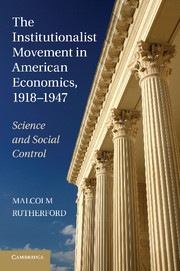Book contents
- Frontmatter
- Contents
- List of Tables
- Acknowledgments
- PART ONE INTRODUCTION
- PART TWO INSTITUTIONALIST CAREERS
- PART THREE CENTERS OF INSTITUTIONAL ECONOMICS
- 5 Institutionalism at Chicago and Beyond
- 6 Amherst and the Brookings Graduate School
- 7 Wisconsin Institutionalism
- 8 Institutional Economics at Columbia University
- 9 The NBER and the Foundations
- PART FOUR CHALLENGES AND CHANGES
- PART FIVE CONCLUSION
- Archive Collections Consulted
- References
- Index
- Titles in the series
6 - Amherst and the Brookings Graduate School
Published online by Cambridge University Press: 03 May 2011
- Frontmatter
- Contents
- List of Tables
- Acknowledgments
- PART ONE INTRODUCTION
- PART TWO INSTITUTIONALIST CAREERS
- PART THREE CENTERS OF INSTITUTIONAL ECONOMICS
- 5 Institutionalism at Chicago and Beyond
- 6 Amherst and the Brookings Graduate School
- 7 Wisconsin Institutionalism
- 8 Institutional Economics at Columbia University
- 9 The NBER and the Foundations
- PART FOUR CHALLENGES AND CHANGES
- PART FIVE CONCLUSION
- Archive Collections Consulted
- References
- Index
- Titles in the series
Summary
We have already examined Walton Hamilton's contribution to the definition of the institutional approach and his own extensive writings, but Hamilton also had a significant impact on institutionalism through the educational programs he pioneered and students he trained. After his own graduate education at Michigan, and a short stay as a faculty member at the University of Chicago, Hamilton was centrally involved in two fascinating educational experiments, the first at Amherst College (1916–1923) and the second at the Robert Brookings Graduate School of Economics and Government (1923–1928).
The list of graduates Hamilton and his colleagues produced is quite outstanding in terms of their future careers in academics and in government. A surprisingly large number of the cohort of institutionalists trained in the interwar period got their start with Hamilton and his colleagues at one or the other of these places. These include Clarence Ayres, Morris Copeland, Mordecai Ezekiel, Anton Friedrich, Carter Goodrich, Isador Lubin, Stacy May, Robert Montgomery, Paul and Carl Raushenbush, Louis Reed, Winfield Riefler, and Willard Thorp. A number of his students were associated with the Research and Statistics Division of the Federal Reserve, and many became centrally involved in the New Deal administration. Other students, while less obviously institutionalist, nevertheless absorbed much from Hamilton's programs, whereas others still became among the best known critics of institutionalism.
- Type
- Chapter
- Information
- The Institutionalist Movement in American Economics, 1918–1947Science and Social Control, pp. 152 - 185Publisher: Cambridge University PressPrint publication year: 2011



